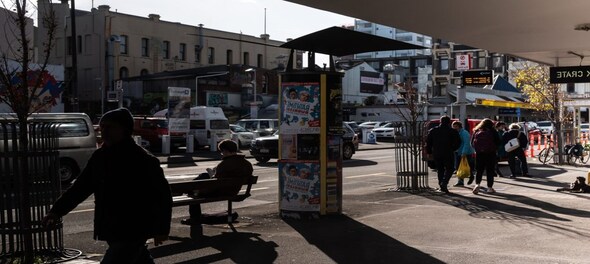
New Zealand’s economy contracted in the first quarter, confirming that a recession began in the final three months of last year and sending the local currency lower.
Gross domestic product fell 0.1 percent from the fourth quarter, when it dropped a revised 0.7 percent, Statistics New Zealand said Thursday in Wellington. Economists expected a 0.1 percent decline. From a year earlier, the economy grew 2.2 percent, less than the 2.6 percent median forecast.
The economy is cooling after the central bank hiked interest rates at a record pace to regain control of inflation, while first-quarter activity was also hampered by a damaging cyclone in February. Confirmation of a recession comes four months before a general election on Oct. 14 in which cost-of-living pressures and the economic downturn are sure to feature.
New Zealand’s dollar fell after the GDP release. It bought 61.94 US cents at 11:24 a.m. in Wellington from 62.18 cents beforehand.
The Reserve Bank predicted 0.3 percent growth in the first quarter and small contractions in the second and third quarters. The Treasury Department in the May budget withdrew a forecast for three straight quarters of contraction this year, saying tourist arrivals, cyclone recovery work and government spending would support growth.
More to come?
“Our economy is smaller than forecast by the RBNZ and Treasury,” said Jarrod Kerr, chief economist at Kiwibank in Auckland. “And the brunt of the slowdown is yet to come. We’re forecasting further contractions over the year ahead.”
The RBNZ has hiked its Official Cash Rate by 5.25 percentage points in the past 20 months to 5.5 percent, with the full impact still to be felt as many households have yet to roll mortgages onto higher interest rates.
At the same time, unemployment at 3.4 percent remains near a record low, tourism is recovering more rapidly than expected and immigration is surging.
The statistics agency said business services was the biggest downward driver in first-quarter GDP, falling 3.5 percent.
It said adverse weather events during the quarter, including severe flooding in Auckland and Cyclone Gabrielle, contributed to falls in horticulture and transport support services, and also disrupted education services.
A 2.4 percent increase in household consumption expenditure was led by higher spending by New Zealanders on international travel. By contrast, households spent less on goods, particularly grocery food.
Check out our in-depth Market Coverage, Business News & get real-time Stock Market Updates on CNBC-TV18. Also, Watch our channels CNBC-TV18, CNBC Awaaz and CNBC Bajar Live on-the-go!


BJP's Hindi heartland dominance faces test in phase 3 polls
May 2, 2024 9:14 PM
Lok Sabha Election: Re-elections at a Ajmer booth after presiding officer misplaces register of voters
May 2, 2024 4:54 PM

